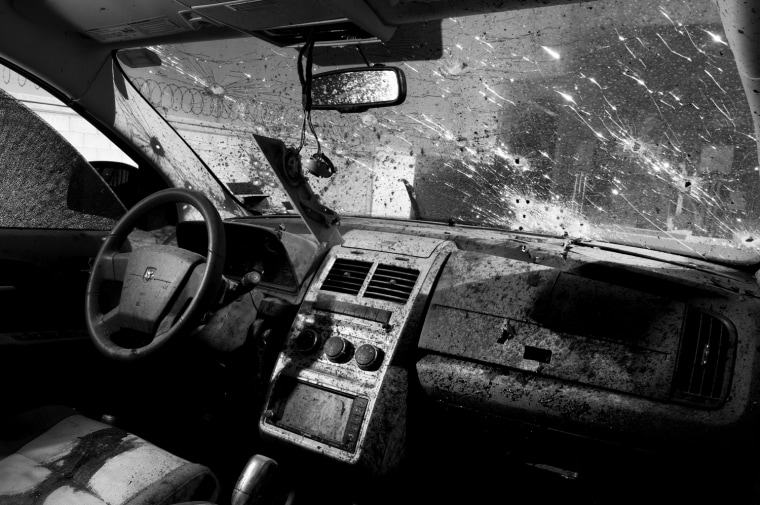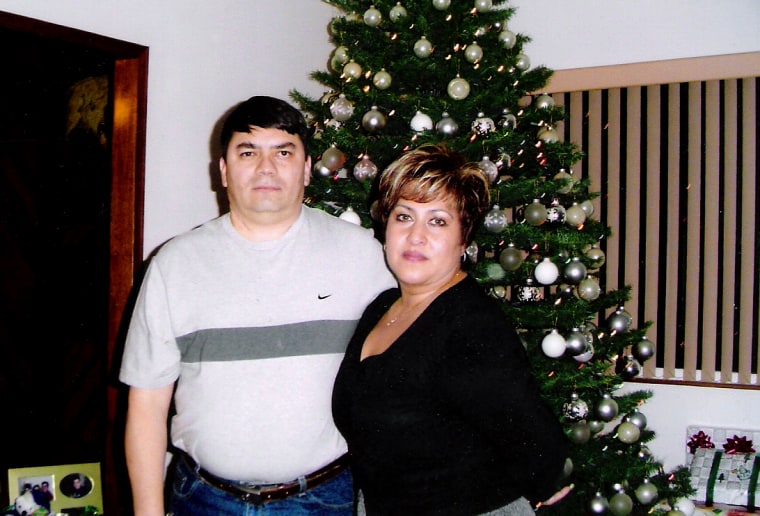Getting the 2009 Dodge in which Jose Molinar's wife was shot dead back into Texas from Mexico quickly grew complicated.
"The inspectors didn’t want to get near it because the way it was with all the blood and everything," said the 48-year-old warehouse supervisor from El Paso. "They were going to put one of those dogs on it to smell, but the dog didn’t want to go near it either."
The car, its windshield splashed with bullet holes, drew plenty of attention as it crossed into the United States about two weeks ago.
"People were looking at it on the bridge and it caused a fender bender," said Molinar, who moved the car into the United States in order to release it to his insurance company. "I think everybody who saw it firsthand thought, 'Here’s a vehicle that was shot at in Juarez, here it is right in front of me.'"
Molinar’s wife of 22 years, Marisela Granados de Molinar, died on Dec. 3, 2008, in Ciudad Juarez, Mexico, when assassins pumped more than 80 rounds into her car.
Molinar does not believe his wife, an office manager in the country’s attorney general’s office, was the target. Instead, the attackers were going after her boss, Jesus Martin Huerta Hiedra, a deputy prosecutor who was catching a ride to Wal-Mart in El Paso.
"One shot hit her right in the heart … when they were shooting at him from the side she was hit again, in her leg, but by then she had already passed," he recently told msnbc.com by telephone, speaking in a low, measured voice.
Molinar's wife was one of an estimated 25,000 El Paso residents who regularly brave growing perils to commute cross-border into Juarez to work.
Granados and Huerta were just two of a growing number of people killed in the war between Mexico’s government and cartels controlling the flow of marijuana, cocaine and methamphetamines into the United States.
The gangs retaliated against the police, army and government officials with horrific violence after President Felipe Calderon Hinojosa started cracking down on traffickers in late 2006. Deaths have spiraled since then: drug-related slayings doubled in 2008 to an estimated 5,300 throughout Mexico. About 1,000 people have been killed so far in 2009.
‘My wife wasn’t afraid’
While Molinar is trying to resign himself to his wife’s death, he is also angry.
"The people that did the shootings could have just taken him, right? It wasn’t like my wife was going to stop them, they were carrying AK-47s and she wasn’t carrying anything. I guess I’m angry at everybody on all sides. First of all, you know the Mexican government, it’s probably going to be one of those unsolved cases," he said.
"The American government — there’s a lot of things, but according to what I've been reading recently all these weapons going across to Mexico (are from the United States)," he said. "So I think everybody here is a little bit to blame."
It is clear that everybody is also more vulnerable, Molinar said.
"My wife wasn’t afraid. Like she said, 'I’m not involved in any of that so I don’t have anything to worry about,'" said Molinar. "But you see what happened, it can happen to you and a lot of people now have realized that because she was one of the ones that was clearly not involved."
Ignoring police barricades
On the day of the assassination, Molinar rushed across the border to Juarez after watching a report of the incident on the television. He ignored police barricades to get to his wife’s car, he said.
"I stood there at the window and I saw my wife, I stood for I don’t know how long," he said. "I needed to be sure, I guess because I couldn’t believe it. I see them every day, especially today," said Molinar, who spoke on the three-month anniversary of his wife’s death.

"There were 85 (bullet) casings — 85 casings — that’s an extremely big amount," said Molinar. "I guess it’s kind of lucky that they didn’t do to my wife what they did to (Huerta), because he got hit with 70. He was hit in the face, the head, just about everywhere you can imagine."
"We were fortunate to have an open casket, I’m sure they weren’t able," he said. "And his family were lucky they didn’t have to see him the way I did."
These and other images from Dec. 3 still haunt Molinar, something going back to work has not helped, as many people suggested it would.
"Everybody said going back to work will help you get your mind off it, but it didn’t, it was worse," he said.
"She would call me at certain times of the day. So when 9:00 came around, I usually got a phone call. When 3:00 came around, same thing," Molinar said. "And now I don’t."
